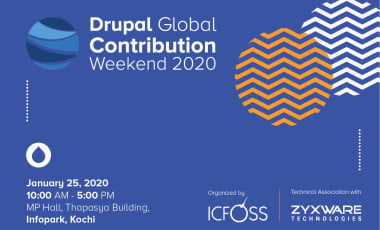DrupalCon Baltimore: Talk with Anoop John
Anoop John, CTO, and founder of Zyxware Technologies got a chance to attend the DrupalCon, Baltimore held between April 24th and 28th, 2017. DrupalCons are occasions Drupalists look forward to, to gather together from across the globe and talk about Drupal and Drupal related trends, business, and opportunities.
Anoop did visit some of our clients before flying back to India, so we could not get him immediately for a chat on his experiences at DrupalCon Baltimore. Here are a few excerpts from the interview.
- Q. What is your main takeaway from DrupalCon Baltimore?
- Q. How do you see Drupal evolving in the future?
- Q. How about headless Drupal? How do you see it playing?
- Q. How is Drupal 8 progressing towards Drupal 9? Dries mentioned that in his keynote
- Q. Anything else you would like to add.
I feel that the whole of the Drupal ecosystem is gearing towards the key value proposition that Drupal 8 is offering and that is Drupal as a digital platform. Every digital company who had a stall at the conference are trying to leverage the strengths of Drupal as a digital platform and project themselves as a digital agency that helps enterprises use Drupal and their services.
Another thing which I realize is that Acquia, the company that is trying to create this big Drupal wave is strongly behind this initiative. And you can see that in the branding that they are projecting. They are also trying to aggressively push this into the large enterprise game. And far away from a create a small website, small do it yourself website kind of games. Some of the large vendors actually brought a lot of their clients to come to the conference. So that is one of the key takeaways from the conference.
Another thing from Zyxware perspective is that there are a lot of opportunities that is opening up. And we are there. In terms of the size of the organization, in terms of what we have done so far, in terms of our vision, in terms of our strategy that we have already outlined. We are quite aligned to where Drupal is heading. For example, one of the key tracks in the conference was about using intelligence AI and AR based systems. Similar systems to allow intelligence to be brought to the platform. One of the keynotes itself demonstrated the ability of Drupal to be the repository which can drive learning and AI engines. Which was very interesting because you need very strong technical competencies to do some of that stuff. And it is very easy to differentiate whether you have that technical competency.
With strong technical competency on the agency front and Drupal with its strong platform capabilities you can actually, go into a lot of unchartered territories with Drupal. Big enterprises are interested. We are no longer in a time period where people are asking,” Hey, Is this open source?” Let us embrace open source. And then AI tools are there. For instance, one of the keynotes demonstrated AI. From the conversation that was shown, you wouldn’t know that you were talking to a bot. You are effectively talking to a sales rep who is trying to help you with picking the right product and showing content related to that.
$ 10 billion worth of new ECM opportunities will be opening in the next 5 years. $ 10 billion worth. That is what Gartner is saying. Now Drupal is approximately worth 7% of all CMS space, right? Now, even if you take 7% of 10 billion that is $ 700 million. Drupal is going to get quite bigger because it is going to compete with AEM on some of these large opportunities. And some of the shares will be higher than the 7 percentage. I do think that there will be a few millions worth of new opportunity for Drupal in the ECM space. But there is also these non-enterprise or non-fortune 2000 kinds of companies. This is the bottom half of the pyramid. I don’t know whether Gartner is actually accounting for that. That market is still interesting enough for companies of our size. In the US, take the top 5 Drupal agencies out of the picture, we are comparable to the rest in terms of size. What is interesting in these numbers is, the pie is still significantly large given the number of players who are going to be taking the pie. So even if we take 1 percentage of that 700 million that is still 7 million. So there is still a lot of opportunity in Drupal in enterprise as well as in the sub or medium to large enterprise space.
And where is it going?
Drupal itself is pitching as an API first platform. That is the key thing. API first. When Drupal 8 was first conceptualized it was a mobile-first but now when it is being branded it actually is being branded, they are pushing it as an API first though mobile first is still there. Which means that enterprises can use Drupal without throwing away all the existing systems. It can be the platform or the portal that connects everything together and speaks to everything with its API.
There was one track for headless Drupal and implementations. Definitely, Dries is pushing for some form of headlessness in Drupal. The full power of Drupal can be achieved when you don’t do headless. But headless will allow you to embrace other technologies, say for example having a full front end developed in Angular 2 and then have Drupal supply the data to that. I think a lot of digital marketing guys would love having that kind of flexibility to create their front end in HTML and JavaScript and not have Drupal developers come into the picture. Especially with the lack and shortage of Drupal talent, they can leverage on PHP, HTML, JavaScript to build a front end app and then Drupal developers can come and take care of the rest of the services. And most of them are out of the box now. I see a lot of that kind of engagement where digital marketing could strongly use headless.
I am not really on top of that but one thing is clear: Migration from Drupal 6 to 7 was tough. 5 to 6 was tough. 6 to 7 was tougher. As for migration from 7 to 8, you effectively have to rebuild your site in 8. One of the key architectural considerations for further development of Drupal is that we are going to eliminate that process. There will be no massive transition. Whatever is in 9 is already in 8. Those things that are not going to be in 9 are already being deprecated in 8. Progressively as you keep up to date with what is happening in Drupal and you upgrade your core, over a period of time your system is already 9 ready. You can flip to 9 in a snap. Without having to go through a painful migration. Which means..it will be actually very interesting for large enterprises.
We are effectively getting a system which you can keep upgrading into the future without a big transition, without any significant jump in cost for any kind of transition. It is just your ongoing development. Sometimes a function is deprecated. You start eliminating that function. The function will continue to be supported for several more versions so you slowly remove that function from your code base and over a period of time that deprecated feature will no longer be used. Which means your system is more ready to go to the next version of Drupal as you move along with versions of Drupal which was not how it was handled in 6 and 7. You have big API change between 6 and 7. You have big API change between 7 and 8. So that is no longer going to be the case.
Transitioning, migrations and updates out of the box is going to be painless and more important than painless it is going to be very fast. Just like a newer version, it is going to have a new set of functions and features that were introduced earlier maybe could have been experimental and the set of function turned off because they were deprecated in the previous versions. That is actually quite big. I’m sure that is going to be very big because it is going to be very tough for competition to do this. Cause this can only be done in Open Source system where there is no licensing involved. Otherwise, they will have to give it for free. So they will have to change their models also. But their APIs are not as heavy as Drupal 8. They expose only what they need to access. But Drupal exposes everything. So I think this is going to be a key consideration for large enterprises.
From a few conversations I had with a set of vendors, I get this feeling that there can be more collaboration between vendors because the opportunity is huge. Large ISPs like IBM, Accenture are going to tap this opportunity. Unless vendors really collaborate much more deeply, I think that small vendors will find it difficult to really benefit out of this Drupal game. So unless you are big you are not going to get that and you will only find that difficult to get into that big league as well. That is what I feel. Maybe there will be more acquisitions. Maybe large vendors will come and acquire some of the small firms.



